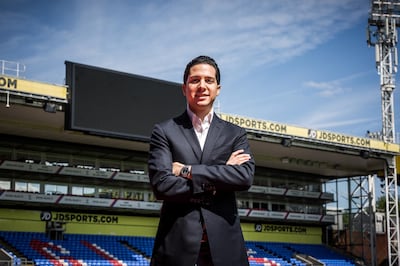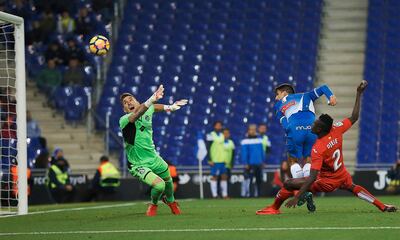Under usual circumstances, Omar Yabroudi could be in Germany. Or Spain. Or France. Or anywhere else in Europe that his job dictates.
The Emirati might be found at any football ground across the continent, running the rule over a promising player, weighing up whether that potential recruit would strengthen his club’s aspirations of becoming a permanent fixture in the top half of the Premier League.
However, with the coronavirus crisis having grounded flights and closed borders, Yabroudi is not helping plot Crystal Palace’s path forward in person. Instead, he’s doing it remotely, from his family home in Dubai.
“If anything, the crisis has brought the scouting department closer together,” says Palace’s player recruitment manager when asked how the pandemic has impacted his role. “We’re Zoom calling at least once a week and interacting for a couple of hours during those calls.
“We’re doing video work on different leagues and cross-referencing our players, while we obviously still have a purpose of finding players to break into the top 10. Because that’s our aim as a club: to break into the top 10 in the Premier League.”
The current online group includes Palace’s entire scouting department – data analysts, live scouts, video scouts – and Dougie Freedman, the former player who now serves as the club’s sporting director. Participants on the call easily number in double figures. It's one of a number of tweaks made at present to Palace’s search for players.
“Normally, that all-in-one meeting would be impossible to take place as frequently,” says Yabroudi, who managed to fly to the UAE from his London base just before the restrictions on travel were implemented in mid-March. “We’d be busy travelling and watching games. There is a lot of travel involved.”
Restrictions or otherwise, the scouting carries on regardless. It has to, given the pressures on Premier League clubs to constantly evolve. In truth, thanks to technology and the talent entrusted, it can be done from anywhere in the world.
Preparation plays a vital part, too. At Palace, the season is divided into different parts: six-eight weeks of video work, where they identify the players, and then another six-eight weeks travelling on a weekly basis to watch them live and supplement those reports.
“As far as live scouting is concerned, of course we miss going to games; we miss the atmosphere,” Yabroudi says. “But we’re already ahead of the game in terms of potential targets. We’re not left behind. We’re proactive in our pursuit of players.”
There have, though, been obvious challenges. Palace prefer to do their business club-to-club, physically meeting counterparts or sitting with prospective additions to the squad and their representatives. That’s where emotional attachments are created. They can prove crucial to sealing a deal.

Take Vicente Guaita, for example. Palace signed the goalkeeper on a pre-contract agreement in January 2018, knowing his deal with Getafe was ending that summer. Yabroudi identified the player, then together with Freedman spent weeks negotiating with Getafe and Guaita, using the time to thrash out terms and build bonds.
Within a year, Guaita had established himself as Palace’s No 1, and has since developed into one of the English top flight’s most influential goalkeepers. Only Liverpool’s Alisson ranks higher in save percentage of those to have played at least half a season. What’s more, Guaita leads Opta’s “expected goals prevented” data, denying almost 10 goals more than expected.
So all the groundwork, the one-to-one meetings and personal touches, was worth it. However, in view of the coronavirus and football’s subsequent hiatus - the Premier League stopped on March 13, with Palace 11th in the table - that’s not possible.
Yet it’s far from a deterrent.
“We would have already established a relationship prior to what’s happened to us because of this pandemic, because we always work ahead of our game,” Yabroudi says. “We’ve always made value-for-money signings, and those don’t happen overnight. We plan way in advance.
“If anything, it only makes sense to continue that relationship through Zoom calls again. We can’t physically meet them now, of course, but we can keep in touch with them on an online basis.
“That emotional attachment can still be there. At the end of the day, if it’s via videoconference, you’re still able to see the guy, his body language, how he speaks to you, how the conversation is going. I wouldn’t pay too much attention to not meeting one-to-one.”

And anyway, Yabroudi reminds, it’s a well-measured, thought-out process.
“We do our homework,” he says. “We have our data on the player; we have reports; we have character references. So it all ties in, one way or the other. To ensure that we succeed with the majority of our signings, we need to cover bases in all aspects. That’s just the way we see it fit.”
Yabroudi, who has worked in his current position since 2017 and boasts a decade of experience in England, says he wouldn’t be surprised if the pandemic constricts the transfer market this summer.
He says, too, that he will trust the advice of the Palace medical staff as to whether it’s safe for him to attend matches in person again whenever the league resumes.
“In terms of live games, it wouldn’t be essential,” Yabroudi says. “Because we’re very confident in the structure we have in place, using the data and reports I mentioned.
“We have an experienced enough team and have proved in the past with the fantastic value signings we’ve made, for example Guaita and Jordan Ayew. Scouting a player live is not the be-all and end-all, although we will have always done that before acquiring them.”
As terrible as the crisis is, it has brought about some inadvertent benefits. Travel, and its obvious impact on the environment, has been greatly reduced – “our scouting system is greener than normal”, Yabroudi highlights – while the shutdown has allowed time for contemplation and introspection.
Considering the blistering pace of the world’s most-watched league, that’s not always feasible.
“This situation has given us time to reflect on past decisions and evaluate how to be more effective in attracting those value-for-money signings,” Yabroudi says. “This is how we believe we can achieve results and also potential financial profits for the club, while also staying competitive on the pitch.
“So, reflection, because we always need to better ourselves. Even though we may have had a good season, we always want to improve on that. That’s how we work.”


